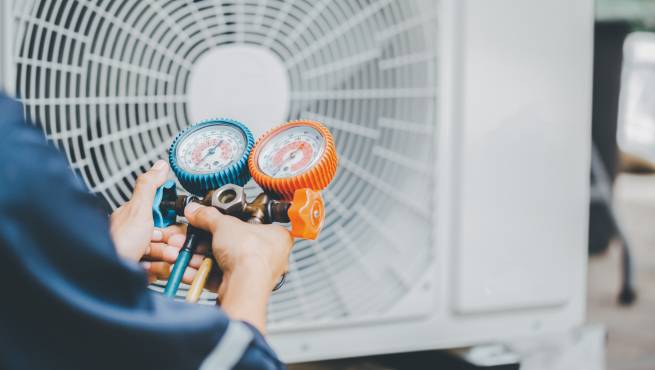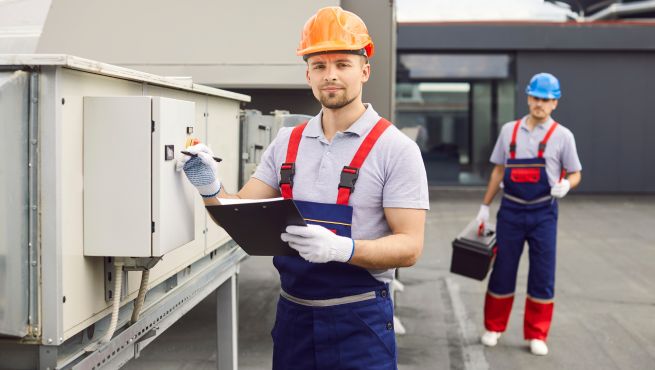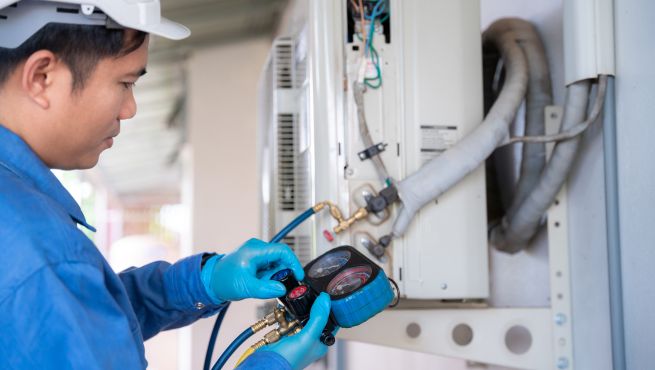Picture this: a scorching summer afternoon, and your air conditioner refuses to turn on. Sound familiar? For many Boston homeowners, property administrators, and business owners, this situation can be frustrating—and stressful. But don’t sweat it just yet! Often, the issue can be resolved with some simple troubleshooting steps.
This guide will help you diagnose common problems that might prevent your AC from starting up, share practical advice to resolve minor issues, and explain when it’s time to call in the professionals—like the reliable team at JCShumann, available 24/7 to assist in Boston. Let’s walk through the process!
Common Reasons Your Air Conditioner Won’t Start
Understanding why your air conditioner isn’t turning on is the first step toward solving the issue. Here are some of the most frequent causes:
1. Power Supply Issues
Your AC needs electricity to function, and a lack of power is often the culprit. Check whether the unit is receiving power:
- Is the AC unit plugged in securely?
- Are nearby appliances working, or could there be a power outage?
- Ensure the circuit breaker hasn’t tripped (more on this below).
2. Tripped Circuit Breaker
Air conditioners require significant electricity. If there’s an overload, the circuit breaker may trip to prevent damage. When this happens, your unit won’t power on:
- Inspect the electrical panel and look for a tripped breaker.
- Reset it by switching it off and back on. If it trips again, that indicates a deeper issue.
3. Thermostat Malfunctions
The thermostat acts as the brain of your AC system. Issues with this component can prevent your air conditioner from functioning:
- Is the thermostat set to “cool” and the temperature correctly adjusted?
- Are the batteries drained? If so, replace them to restore functionality.
4. Dirty or Clogged Air Filters
Airflow plays a critical role in keeping your system operational. Clogged filters can cause overheating, which may prevent the AC from working altogether. Regular cleaning or filter replacement can resolve this problem.
5. Delayed Start
Some AC systems include a feature to delay startup after being turned off. This delay reduces electrical surges but can catch homeowners off guard. Wait a few minutes to see if the unit starts up on its own.
6. Blown Fuses
If your system is blowing fuses, it signals an electrical issue. Replacing the fuse may fix the problem temporarily, but it’s worth investigating why this is happening.
Step-by-Step Troubleshooting Tips to Get Your AC Running
Once you’ve identified the potential cause, follow these step-by-step tips to troubleshoot your AC:
Step 1. Check the Power Source
Ensure the AC is plugged in and that power is reaching the unit. Try running another electronic device using the same outlet to confirm electricity flow.
Step 2. Inspect the Circuit Breaker
Locate your home’s electrical panel. If the AC breaker has tripped, reset it to restore power to the system. If the breaker continues to trip, contact a professional immediately to avoid electrical hazards.
Step 3. Examine the Thermostat
- Replace the batteries if needed.
- Verify the settings—switch it to “cool,” and set the desired temperature lower than the current room temperature.
- If the display is blank or showing erratic readings, the thermostat may need replacement.
Step 4. Clean or Replace the Air Filter
Dirty filters restrict airflow and can cause your system to shut down. Remove the filter from the system, check for debris, and either clean or replace it as necessary. For best performance, replace filters every 1-3 months.
Step 5. Inspect the Outdoor Unit
Debris, dirt, or obstructions in the outdoor condenser unit can prevent the system from working. Turn off the power and gently clean it with a garden hose. Ensure nothing is blocking airflow around the unit.
Step 6. Test the Unit After Each Adjustment
After attempting each troubleshooting step, turn the AC on to check if the problem is resolved. Patience is key as some units may require a few minutes to stabilize and start running.
When to Call a Professional for Persistent AC Problems
While DIY troubleshooting can resolve many minor issues, some problems require the expertise of a licensed HVAC technician. Here’s when it’s time to call a professional like JCShumann:
1. Persistent Startup Issues
If your AC still won’t turn on despite troubleshooting, it’s likely there’s a deeper issue—such as faulty wiring, blown capacitors, or compressor problems—that only a trained expert can diagnose and resolve safely.
2. Repeated Circuit Breaker Trips
This could indicate significant electrical issues that pose safety hazards. A professional technician can inspect your system to pinpoint and fix the underlying cause.
3. Unusual Noises
Grinding, banging, or buzzing sounds aren’t normal and suggest a mechanical problem. Continuing to run a noisy AC could worsen the issue or lead to a complete breakdown.
4. Refrigerant Leaks
If your system blows warm air or freezes over, it may be low on refrigerant due to a leak. Handling refrigerants requires specialized knowledge and tools, making professional intervention essential.
5. Regular Maintenance & Tune-Ups
To prevent future problems and keep your AC running efficiently, schedule professional tune-ups at least once a year. This can extend the life of your system and save you money on costly repairs.
How JCShumann Can Help 24/7 in Boston
Don’t let air conditioner troubles leave you sweltering in the heat. JCShumann is Boston’s trusted HVAC expert, available anytime—day or night—to restore your comfort quickly and efficiently. Whether it’s routine maintenance, complex repairs, or a full system replacement, our certified technicians have the expertise to handle it all.
Contact JCShumann today for prompt and professional AC services. You’ll get reliable solutions that ensure your system functions safely and effectively.




